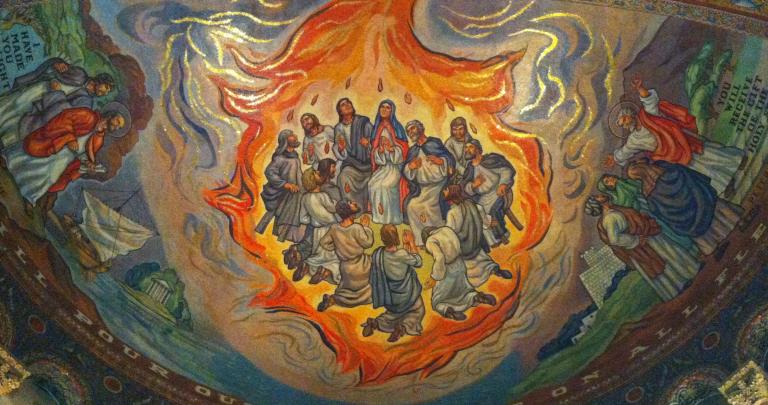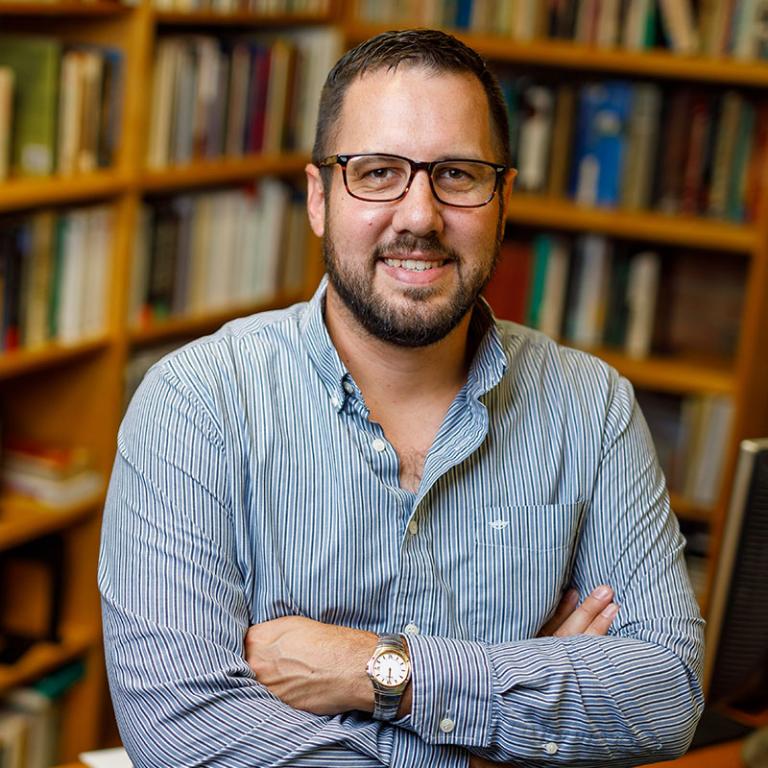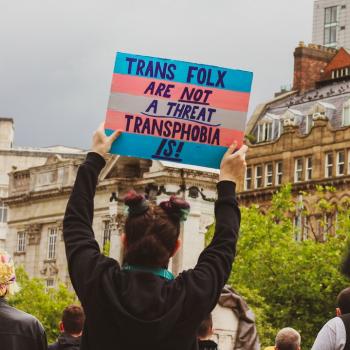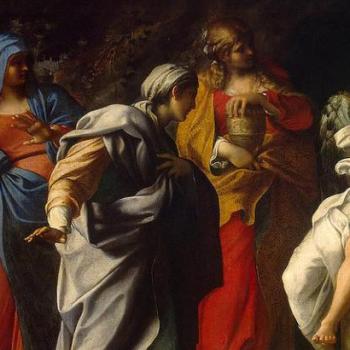Huldah: Speaking Truth
By David C. Cramer
Read 2 Kings 22:8–20; 2 Chronicles 34:14–28; Acts 2
This Sunday we celebrate Pentecost. Pentecost, meaning “50,” is a Jewish holiday that celebrates the fiftieth day after Passover. For Christians, it celebrates the day the Holy Spirit was poured out on the first believers, fifty days after Easter.

On that day, the apostle Peter quotes the prophet Joel to explain why everyone gathered is able to hear about “the wonderful things God has done” in their own languages:
‘In the last days,’ God says,
‘I will pour out my Spirit upon all people.
Your sons and daughters will prophesy.
Your young men will see visions,
and your old men will dream dreams.
In those days I will pour out my Spirit
even on my servants—men and women alike—
and they will prophesy.
And I will cause wonders in the heavens above
and signs on the earth below—
blood and fire and clouds of smoke.
The sun will become dark,
and the moon will turn blood red
before that great and glorious day of the Lord arrives.
But everyone who calls on the name of the Lord
will be saved.’ (Acts 2:17–21; cf. Joel 2:28–32)
For Peter, this prophecy is being fulfilled in their midst. That early group of believers, women and men, old and young, slave and free, are filled with the Spirit and empowered to prophesy.
Sometimes we can miss the significance of this moment because we have a skewed understanding of what it means to prophesy. We tend to equate prophecy with soothsaying or fortune-telling. Prophecy is all about predicting the future, we tend to assume.
But, while predicting the future can be one aspect of prophecy, it is a fairly minor aspect. Prophecy is about so much more than that. You can predict the future without prophesying, and you can prophesy without predicting the future.
So what, then, does it mean to prophesy? And why is it significant that the Holy Spirit empowers believers with this gift irrespective of their gender, age, or social status?
To answer these questions, I want to turn to the Old Testament story of the prophet Huldah.
Huldah is a prophet during the reign of King Josiah in Judah, about 600 years before Jesus’s birth. Her story is told in both 2 Kings 22 and 2 Chronicles 34.
In this story, Josiah becomes king when he is only 8 years old, and he reigns for 31 years. At about the age of 16, Josiah begins to seek after God, after generations of kings before him have forsaken God to follow after idols and false gods. Josiah institutes many reforms to remove idols and restore the Temple for worship of the Lord.
While work is being done to restore the Temple, the high priest Hilkiah discovers a copy of the scroll of the Book of the Law written by Moses. (Today we would refer to this as the Book of Deuteronomy.) The kingdom has been in such disarray for so long that this scroll has been completely lost, and no one has been following it. So when Hilkiah discovers it, he gives it to the court secretary, Shaphan, to read to King Josiah.
When Josiah hears the words of the Law being read and realizes how far the kingdom has strayed from it, he tears his clothes in despair and orders Hilkiah, Shaphan, and a few of his other court officials:
Go to the Temple and speak to the Lord for me and for all the remnant of Israel and Judah. Inquire about the words written in the scroll that has been found. For the Lord’s great anger has been poured out on us because our ancestors have not obeyed the word of the Lord. We have not been doing everything this scroll says we must do. (2 Chron. 34:21)
With this order to speak to the Lord on the king’s behalf, what do these men do? They seek out the prophet Huldah, wife of Shallum, the keeper of the Temple wardrobe.
There were other major prophets during the reign of Josiah that they could have consulted instead: Jeremiah, Zephaniah, Nahum. But they go to Huldah, who is one of seven female prophets mentioned by name in the Old Testament.
Sure enough, Huldah has a message from the Lord to the king.
“The Lord, the God of Israel, has spoken! Go back and tell the man who sent you, ‘This is what the Lord says’,” she begins (2 Chron. 34:23–24). She then offers a word of judgment on the kingdom. Deuteronomy lists blessings on those who follow the law and curses on those who don’t. And because the people have strayed so far from the Law, Huldah states that the curses will indeed come to pass.
But along with this word of judgment, Huldah also offers a word of mercy. “This is what the Lord, the God of Israel, says concerning the message you have just heard,” she states (2 Chron. 34:26). And she then describes how King Josiah will be spared of this fate because of his humble acts of repentance.
When the king’s officials take this message back to King Josiah, he immediately summons all the priests and elders of the kingdom to the Temple. There King Josiah and all the people gathered pledged themselves to be faithful once again to their covenant with the God of their ancestors.
And so, the story concludes, throughout the rest of King Josiah’s lifetime, the people of Judah do not turn away from the Lord, the God of their ancestors (2 Chron. 34:33).
So what does this story of Huldah tell us about prophecy and the significance of Pentecost? I think it teaches us this:
A prophet is a person that someone seeks out when they need a word from the Lord. Prophesying isn’t so much about future-telling as it is about truth-telling.
When King Josiah needed to hear the word of God to help him understand his situation and what he should do, his officials sought out Huldah to provide that message from the Lord. Huldah is able, with confidence, to speak a word from the Lord because she knows the Word of the Lord. Inspired by the Holy Spirit, she is able to interpret the words of Deuteronomy and rightly apply them to the present crisis.
And, according to the apostle Peter, quoting the prophet Joel, this is the significance of Pentecost:
The Holy Spirit is poured out on all the believers so that we can all be Huldahs in our day.
You don’t have to have a Bible degree.
You don’t have to have a title.
And you certainly don’t have to be a man—or even an adult!
When you are filled with God’s Spirit, you too can proclaim “the wonderful things God has done” (Acts 2:11).
Like Huldah, like the early believers, you too can be God’s spokesperson, God’s prophet. And in so doing, you can call God’s people back to fierce faithfulness to God: to destroying our idols and become a people who worship in Spirit and in truth.
A people who devote ourselves to the apostles’ teaching, and to fellowship, and to sharing in meals, and to prayer.
A people who share a deep sense of awe at the many miraculous signs and wonders God does in our midst,
A people who meet together and share everything we have.
Who share with those in need.
Who worship together each day.
Who share meals with great joy and generosity.
And who praise God and enjoy the goodwill of all the people. (Acts 2:42–47)












